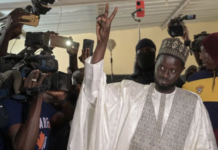On Monday, Li Yang, China’s consul general in Rio de Janeiro, took to Twitter to mock the rescue efforts following the Surfside, Florida, building collapse. “American-style rescue: very layman in saving people, but too expert in blasting!!!” Li wrote, including side-by-side pictures of the partially collapsed condominium and its demolition with explosives.
In other recent tweets, Li called Adrian Zenz, a researcher who has written extensively about internment camps in Xinjiang, a liar. Li also referred to Canadian prime minister Justin Trudeau as “boy” and branded him “a running dog of the U.S.” Such outbursts have helped Li rack up nearly 27,000 followers on Twitter—even though the platform is blocked in China.
Li is one of dozens of Chinese diplomats who have found a home on Twitter in recent years, taking to the site with Trumpian bravado to raise their profiles at home and abroad. Spurred on by Chinese president Xi Jinping, who took power in 2013, this vocal cohort—nicknamed “wolf warriors” after the nationalistic movie franchise of the same name—fanned out across the globe, bashing enemies and bristling at even the mildest criticism.
Xi has brought China a renewed focus on ideology, as well as the return of Mao-era tools that include reeducation camps and collective study sessions. When Chinese diplomats see such domestic moves, “they are very good at calibrating their response to that in a way that safeguards their own individual interests,” says Peter Martin, whose new book, China’s Civilian Army: The Making of Wolf Warrior Diplomacy, traces the history of China’s diplomatic corps.
For today’s diplomats, safeguarding their interests often requires stridently defending China’s interests and image—both online and off. Last year, Chinese officials sparked a fistfight at a diplomatic event in Fiji, when they showed up uninvited to a celebration for Taiwan’s national day.
The aggressive, nationalistic style can seem highly undiplomatic, counterproductive even—but it plays well to patriotic audiences back home and can be a path to promotion. Combative messages on Western social media and theatrical outbursts often end up trickling back to Chinese social media, says Maria Repnikova, a professor at Georgia State University whose research focuses on journalism and public messaging in non-democratic regimes. The messaging also ends up reflected in state media and amplified by coordinated influence campaigns that have been traced to China.
As a diplomat posted to Pakistan in 2015, Zhao Lijian filled his feed both with tweetstorms attacking the US and posts extolling China-Pakistan economic collaboration. By 2019, soon after sparking a Twitter spat with former US national security adviser Susan Rice, Zhao returned to Beijing and was promoted to be a spokesperson for the Foreign Ministry. From that perch, he tweeted on March 12, 2020, that the US Army might have brought Covid-19 to China.
In 2016, when a Canadian reporter asked China’s foreign minister, Wang Yi, about a Canadian citizen accused of spying and detained in China, Wang responded, “Your question is full of arrogance and prejudice against China … This is totally unacceptable.” His remarks went viral, and an online fan club for Wang—who’d already been named a “silver fox” by the Chinese press—racked up more than 130,000 members. It’s a stark contrast to the mid-2000s, when nationalistic citizens mailed calcium pills to the Foreign Ministry to suggest that officials needed to grow backbones in the face of international criticism of China’s human rights record.
While the medium is new, the approach is not—although the volume can be turned up or down depending on the needs of the day. As Martin writes, in November 1950, general-turned-diplomat Wu Xiuquan gave a fiery 105-minute speech at the United Nations in which he labeled the US, then facing off against China in the Korean War, “the cunning aggressor in their relations with China” and called for sanctions against the US.
“At times, Chinese diplomats are very charming, impressive, and they use the discipline that has been cultivated in the Foreign Ministry to win over international opinion and win friends for China,” says Martin. At other times, though, such as during the Cultural Revolution and again more recently, “there’s been this very combative and even aggressive side to Chinese diplomacy.”
That contrast was on display in Anchorage, Alaska, in March, during the first US-China summit under the Biden administration. After critical remarks from US secretary of state Antony Blinken about China’s mistreatment of the largely Muslim Uyghur population, economic coercion, and breaches of international norms, Chinese vice minister of foreign affairs Yang Jiechi launched into an angry speech for the assembled cameras, referencing, among other things, Black Lives Matter protests in the US. Once the cameras were gone, the talks were said to be cordial and productive.
To write China’s Civilian Army, Martin, a reporter for Bloomberg, spent four years poring over about 100 memoirs of former diplomats and interviewing Chinese and international officials to unpack the historical roots of wolf warrior behavior.
The book’s title comes from remarks that Zhou Enlai, China’s first premier and foreign minister, made to the new members of his diplomatic corps in November 1949. “Armed struggle and diplomatic struggle are similar,” he said. “Diplomatic personnel are the People’s Liberation Army in civilian clothing.”
The founding of the People’s Republic of China in 1949 was meant to reassert China’s position in the world and mark its recovery from the “century of humiliation”—a cascade of offenses cited by nationalists to this day. At the time, the country was diplomatically isolated and subject to the whims of Mao’s personality and policy making.
Zhou’s early attempts to shape interactions with the outside world set a mold that continues. Diplomats generally work in pairs, keeping tabs on one another. According to non-Chinese diplomats Martin spoke to, their Chinese counterparts stick faithfully to talking points and never betray internal struggles. The strict discipline allows no room for negotiation, but there’s also no confusion about where China stands. (Another recent book, Josh Rogin’s hawkish Chaos Under Heaven, reveals the infighting and mixed messages that characterized the Trump administration’s response to China.)
Today some diplomats and other observers in China are questioning whether wolf warrior tactics have gone too far. In early June, Xi himself told senior officials China should communicate in a tone that is more “modest and humble” and project a “credible, lovable, and respectable image” abroad. Repnikova thinks Xi’s remarks might signal that, despite its economic prowess and attempts to win friends with masks and medical supplies during the pandemic, China hasn’t been effective at projecting soft power or earning the respect it craves on the global stage.
But Xi’s actions since then call into question his commitment to toning down the rhetoric. On July 1, he commemorated the 100th anniversary of the founding of the Chinese Communist Party with a speech in which, according to the official translation, he said, “we will never allow any foreign force to bully, oppress, or subjugate us.” Chinese netizens, many of whom posted on social media to mark the party’s anniversary, approved.
Xi is also expected to name Qin Gang as the new ambassador to Washington. Qin was known to lash out in defense of China during his time as chief of protocol and when working on European affairs in Beijing. Qin’s predecessor, outgoing Ambassador Cui Tiankai, was a more traditional diplomat and often quelled fires in Washington, such as reaching out to Rice after Zhao’s outburst.
Even if Xi succeeds in making official Twitter feeds more “modest and humble,” it will do little to assuage Western concerns about China’s transparency over the origins of Covid-19, industrial policy, and attacks on Hong Kong’s democracy.
“I don’t see any way that you can repackage China’s policy on reeducation camps in a way that could possibly be persuasive to Western political elites,” says Martin. “Without some shift in policies, I don’t really see how a tweaking of wolf warrior tactics is going to help to improve China’s image very much. And I don’t really think that that shift in policy is in the cards.”
- 📩 The latest on tech, science, and more: Get our newsletters!
- The 60-year-old scientific screwup that helped Covid kill
- Miami’s tower collapse and humanity’s fight for the future
- America’s ‘smart city’ didn’t get much stronger
- The importance of the Games Done Quick marathon
- How researchers hacked ATMs by waving a phone
- 👁️ Explore AI like never before with our new database
- 🎮 WIRED Games: Get the latest tips, reviews, and more
- 📱 Torn between the latest phones? Never fear—check out our iPhone buying guide and favorite Android phones







